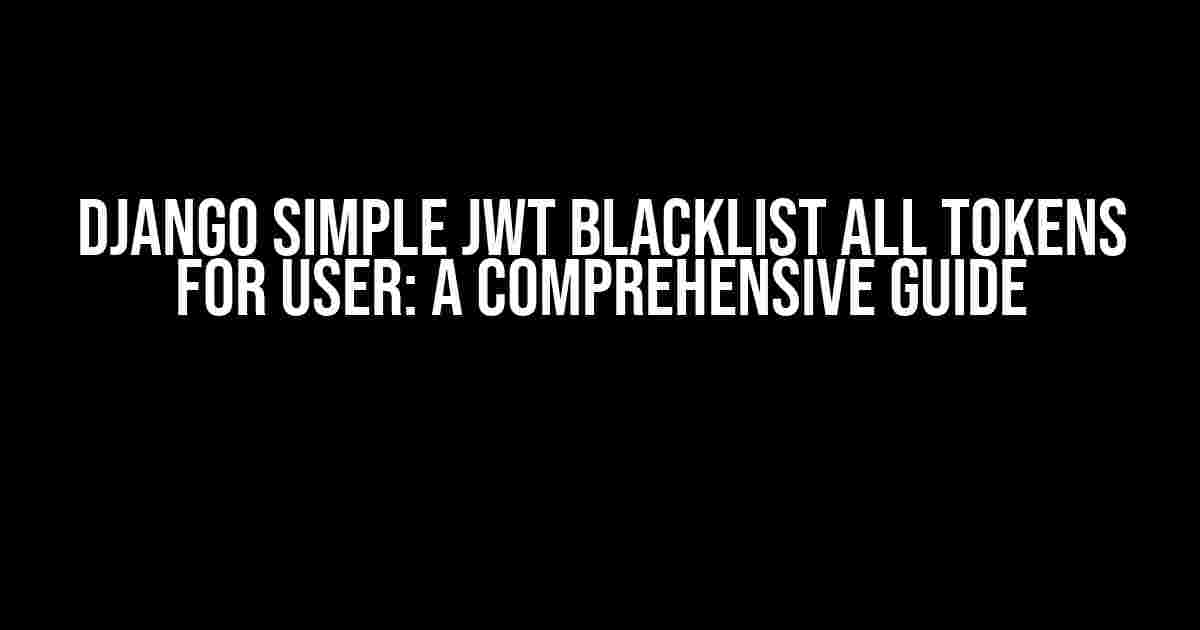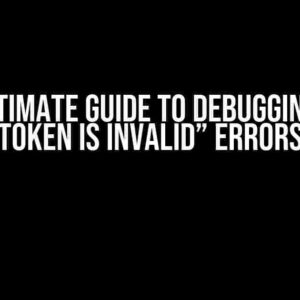As a Django developer, you’re probably no stranger to JSON Web Tokens (JWTs) and their role in securing your application’s authentication system. One popular library for working with JWTs in Django is Simple JWT. In this article, we’ll dive into the world of Simple JWT and explore how to blacklist all tokens for a user, ensuring their secure log out and revocation of access.
What is Simple JWT?
Simple JWT is a Django package that provides a simple way to work with JSON Web Tokens (JWTs) in your application. It allows you to easily generate, verify, and refresh tokens, making it a popular choice for authentication and authorization in Django projects.
Why Blacklist Tokens?
So, why would you want to blacklist all tokens for a user? Well, there are several scenarios where this is essential:
- Security breach: If a user’s account has been compromised, you’ll want to revoke all their active tokens to prevent further unauthorized access.
- User account changes: When a user changes their password or updates their account information, you may want to invalidate all their existing tokens to ensure they’re no longer usable.
- Logout functionality: When a user logs out, you’ll want to blacklist their token to prevent them from accessing protected resources without re-authenticating.
Setting Up Simple JWT
Before we dive into blacklisting tokens, let’s quickly cover the basics of setting up Simple JWT in your Django project.
First, install Simple JWT using pip:
pip install djangorestframework-simplejwtNext, add Simple JWT to your Django project’s `INSTALLED_APPS`:
INSTALLED_APPS = [
# ...
'rest_framework_simplejwt',
# ...
]Configure Simple JWT in your project’s `settings.py` file:
SIMPLE_JWT = {
'USER_ID_FIELD': 'id',
'USERNAME_FIELD': 'username',
'USER_ID_CLAIM': 'user_id',
}Blacklisting Tokens with Simple JWT
Now that we have Simple JWT set up, let’s explore how to blacklist all tokens for a user.
Token Blacklist Model
Simple JWT provides a built-in `TokenBlacklist` model that stores blacklisted tokens. To use this model, you’ll need to create a database migration:
python manage.py makemigrationspython manage.py migrateBlacklisting Tokens
To blacklist all tokens for a user, you can use the `TokenBlacklist` model in conjunction with the `SimpleJWT` token generator. Here’s an example:
from rest_framework_simplejwt.tokens import OutstandingToken, BlacklistedToken
from django.contrib.auth.models import User
def blacklist_all_tokens_for_user(user: User):
tokens = OutstandingToken.objects.filter(user=user)
for token in tokens:
blacklist_token = BlacklistedToken(token=token)
blacklist_token.save()This function takes a `User` object as an argument and blacklists all their outstanding tokens by creating a new `BlacklistedToken` instance for each one.
Implementing Token Blacklisting in Your App
Now that we have the `blacklist_all_tokens_for_user` function, let’s explore how to integrate it into your Django app.
Logout View
When a user logs out, you can call the `blacklist_all_tokens_for_user` function to invalidate their tokens:
from rest_framework.response import Response
from rest_framework.views import APIView
from django.contrib.auth.models import User
class LogoutView(APIView):
def post(self, request):
user = request.user
blacklist_all_tokens_for_user(user)
return Response({'message': 'Logged out successfully'})User Account Changes
When a user updates their account information, you can call the `blacklist_all_tokens_for_user` function to invalidate their tokens:
from django.contrib.auth.signals import user_changed
from django.dispatch import receiver
@receiver(user_changed)
def blacklist_tokens_on_account_change(sender, user, **kwargs):
blacklist_all_tokens_for_user(user)Conclusion
In this article, we’ve explored the world of Simple JWT and learned how to blacklist all tokens for a user in Django. By implementing token blacklisting, you can ensure the security and integrity of your application’s authentication system.
Remember to always prioritize security and follow best practices when working with sensitive user data. Happy coding!
| Scenario | Token Blacklisting |
|---|---|
| Security breach | Blacklist all tokens for affected users |
| User account changes | Blacklist all tokens for affected users |
| Logout functionality | Blacklist the user’s token on logout |
By following this comprehensive guide, you’ll be well on your way to securing your Django application with Simple JWT and token blacklisting.
Final Tips and Tricks
- Monitor token blacklisting: Keep an eye on token blacklisting in your production environment to ensure it’s working correctly.
- Implement token expiration: Consider implementing token expiration to reduce the impact of token blacklisting.
- Use token introspection: Use token introspection to verify tokens before validating them.
With these final tips and tricks, you’ll be well-equipped to handle token blacklisting in your Django application.
Frequently Asked Question
Get answers to your burning questions about Django simple JWT blacklist all tokens for user!
What is the purpose of blacklisting tokens in Django simple JWT?
Blacklisting tokens in Django simple JWT allows you to revoke access to a user’s account, ensuring that even if an attacker obtains a valid token, it will be invalid and unable to access protected resources. This adds an extra layer of security to your application!
How do I blacklist all tokens for a user in Django simple JWT?
To blacklist all tokens for a user, you can use the `OutstandingToken` model to get all tokens for the user and then mark them as blacklisted. You can do this by iterating over the tokens and setting `token.blacklisted = True` and then saving the changes. Voilà!
What happens when I blacklist a token in Django simple JWT?
When you blacklist a token, it is marked as invalid and added to the blacklist. When the token is used to make a request to a protected resource, Django simple JWT will check if the token is blacklisted and reject the request if it is. This ensures that even if an attacker obtains a valid token, it will be invalid and unable to access protected resources!
Can I use the `blacklist_tokens` signal to blacklist tokens in Django simple JWT?
Yes, you can use the `blacklist_tokens` signal to blacklist tokens in Django simple JWT. This signal is sent when a token is blacklisted, and you can use it to perform additional actions, such as sending a notification to the user or logging the event. It’s a great way to extend the blacklisting functionality!
Is blacklisting tokens a foolproof security measure in Django simple JWT?
While blacklisting tokens is a great security measure, it’s not foolproof. Tokens can still be stolen or compromised, and an attacker may be able to use them before they are blacklisted. Therefore, it’s essential to implement additional security measures, such as token expiration and rotation, to ensure the security of your application!




